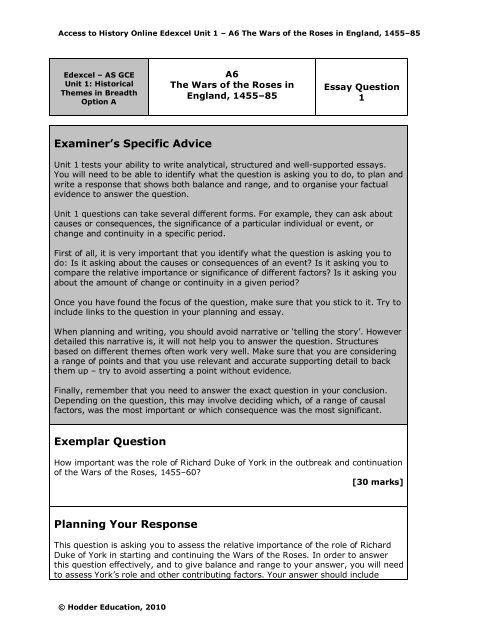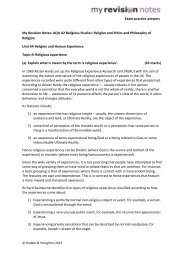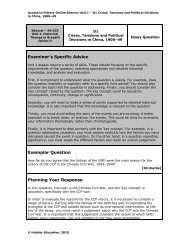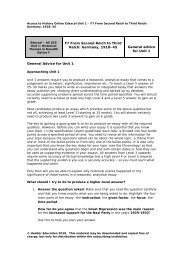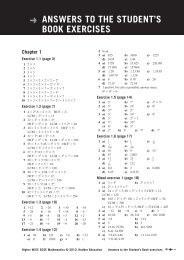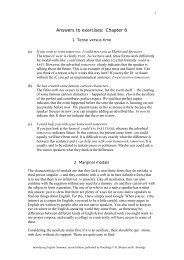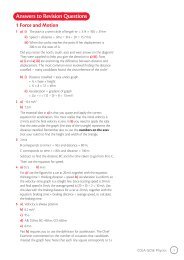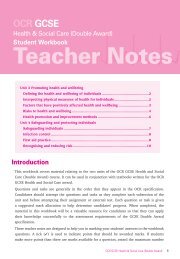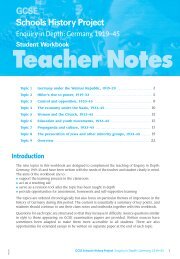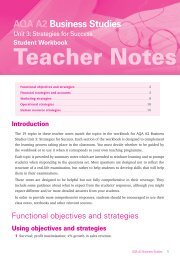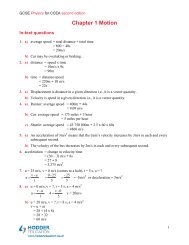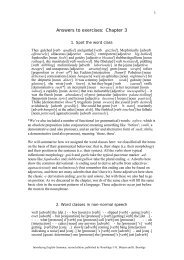Edexcel – Unit 1 - Access to History 2
Edexcel – Unit 1 - Access to History 2
Edexcel – Unit 1 - Access to History 2
Create successful ePaper yourself
Turn your PDF publications into a flip-book with our unique Google optimized e-Paper software.
<strong>Access</strong> <strong>to</strong> His<strong>to</strong>ry Online <strong>Edexcel</strong> <strong>Unit</strong> 1 – A6 The Wars of the Roses in England, 1455–85evidence drawn from the period leading up <strong>to</strong> the outbreak of the conflict rightthrough <strong>to</strong> 1460. To reach a conclusion, you will also need <strong>to</strong> compare York’s rolewith a range of other fac<strong>to</strong>rs which could include the weakness of Henry VI as king,the role of other individuals such as Margaret of Anjou, or the existence of rivalpower bases.One possible way <strong>to</strong> structure an answer <strong>to</strong> this question would be:• Introduction: briefly list the fac<strong>to</strong>rs you are going <strong>to</strong> discuss (including York’srole) and hint at your argument• York’s role in the outbreak of the war• York’s role in the continuation of the fighting• The weaknesses of Henry VI• Rival power bases and the inconclusive nature of the fighting• Conclusion with an answer <strong>to</strong> the questionExaminer’s Exemplar Answer 1Richard Duke of York was born in 1411 and waskilled at the Battle of Wakefield in 1460. He was avery powerful member of the nobility and causedmany problems for the king and the country (1).Richard Duke of York was a very powerful nobleand had a claim <strong>to</strong> the throne. In the 1430s and1440s he was quite successful fighting in Franceand he was the Lieutenant of France for some ofthis period. He was then made Lieutenant ofIreland. This made him angry and ready <strong>to</strong> rebel.York caused war <strong>to</strong> break out because he wasangry at Henry VI’s decisions. He went <strong>to</strong> waragainst Henry in 1455 and won the Battle of StAlbans. This shows that York was very importantin starting the wars (2).York tried <strong>to</strong> be first Protec<strong>to</strong>r then King. He wasProtec<strong>to</strong>r first in 1454–5 and then again later on.He fought against the Lancastrians at LudfordBridge, but was defeated and went in<strong>to</strong> exile inIreland. Sometime later, he decided <strong>to</strong> return. Hearrived in Parliament and placed his hand on theempty throne, showing that he wanted <strong>to</strong> be king.This upset the Lancastrians even more and theycontinued <strong>to</strong> fight York. In 1460, York made themistake of rushing out of his castle at Wakefieldand was killed by the Lancastrian army. Thisended York’s role in the conflict but the warscontinued (3).(1) The introduction showssome knowledge of York’s role,but does not identify thedemands of the question or thatthe answer needs balance.(2) The paragraph does try <strong>to</strong>focus on the question at the endof the paragraph, but starts offas narrative that is not maderelevant <strong>to</strong> the question. It istrue that York was angry withHenry VI, but the reasons forthis need more detailed supportand explanation.(3) This paragraph is mostlynarrative and is vague in placesin terms of dates. It could bemade more relevant by theinclusion of references <strong>to</strong> theprecise question.Henry VI also helped cause the Wars of the Roses.He was a very poor King. He disliked fighting and© Hodder Education, 2010
<strong>Access</strong> <strong>to</strong> His<strong>to</strong>ry Online <strong>Edexcel</strong> <strong>Unit</strong> 1 – A6 The Wars of the Roses in England, 1455–85wanted <strong>to</strong> end the wars in France which made himunpopular. He had a mental breakdown and wasunable <strong>to</strong> rule which meant other people like Yorkand Margaret of Anjou argued about who shouldrule for him. Henry also could not control hisnobility. He could easily be manipulated by thosearound him and gave away <strong>to</strong>o much land andmoney which made him poor. He also preferrednot <strong>to</strong> resolve disputes amongst the nobles. All ofthis made him unsuitable as a king and causedwar (4).Margaret of Anjou manipulated her husbandHenry and was determined that her son Edwardshould be the next king. She also fought York forthe Protec<strong>to</strong>rate and banished him and hissupporters (5).In conclusion, York was definitely very importantin causing the Wars of the Roses as he was a verypowerful member of the nobility with a grudge.Henry VI and Margaret of Anjou were alsoimportant because he was weak as king and shewas <strong>to</strong>o ambitious (6).(4) This paragraph is better inthat it is more focused on thepart of the question that dealswith causes. However, it needsmore precise supporting detailrather than generalisedassertion.(5) All of this is true, but is notmade relevant <strong>to</strong> the question.(6) The candidate attempts aconclusion, but does not reach ajudgement on the actualquestion. The focus is more onthe causes of the war ratherthan the continuation <strong>to</strong> 1460.Examiner’s AssessmentThis response would achieve a Level 3 mark. Thecandidate has unders<strong>to</strong>od some of the demands ofthe question and has attempted <strong>to</strong> look at thereasons for the outbreak of civil war. However,the answer lacks balance in that it does not reallyconsider why the wars continued. Although theinformation is generally accurate, it is not alwaysfocused on the question and is not sufficientlydetailed for Level 4.Examiner’s Exemplar Answer 2When explaining the outbreak and continuation ofthe Wars of the Roses, 1455–60, York’s role isundoubtedly very important (7).Without hisactions in the early 1450s, tensions between rivalfactions may not have arisen. Similarly, hisambition and determination not <strong>to</strong> compromiseled <strong>to</strong> the continuation of the dispute until hisdeath in 1460. However, the conflict did not endwith York’s death. This suggests that other fac<strong>to</strong>rsmay have played an equally important part in(7) Here, the student is usingthe key words in the question <strong>to</strong>show that they understand whatit is asking them <strong>to</strong> do.© Hodder Education, 2010
<strong>Access</strong> <strong>to</strong> His<strong>to</strong>ry Online <strong>Edexcel</strong> <strong>Unit</strong> 1 – A6 The Wars of the Roses in England, 1455–85causing and continuing the civil war. Theseinclude the failures of Henry VI as king incontrolling his kingdom, and, once the fightingbroke out, the existence of rival power bases andthe nature of the fighting where neither side wasable <strong>to</strong> force a vic<strong>to</strong>ry (8).Richard Duke of York played a crucial role incausing the Wars of the Roses. He was the mostpowerful noble in the country, owning vast landedestates and, before Oc<strong>to</strong>ber 1453, he was also thenext in line <strong>to</strong> the throne. Because of his position,York assumed that he would play a leading role inadvising the king and helping <strong>to</strong> govern thecountry; he would also have expected <strong>to</strong> receivepatronage from the king – gifts of land and office– and <strong>to</strong> have a place at the King’s Court and onhis Council. However, Henry VI, advised by hiswife Margaret of Anjou, surrounded himself with acircle of favourites from which York was excluded.These favourites, such as Somerset, receivedimportant grants, such as the influential role ofCaptain of Calais in 1451. As early as 1452, York’sanger at this situation led <strong>to</strong> him marching onLondon with an armed retinue, showing that hewas prepared <strong>to</strong> use violence <strong>to</strong> secure his placeat Court. Also, in 1455, it was York who raised anarmy which led <strong>to</strong> the first battle at St Albans andthe start of the Wars of the Roses. This showsthat York’s role in actually starting the conflictwas crucial (9).York also played a leading part in the conflict <strong>to</strong>1460. He remained suspicious of the motives ofMargaret of Anjou; for example, he refused <strong>to</strong>appear at a Great Council held in Coventry in1459, instead recruiting troops and facing the kingin battle at Ludford Bridge. Also, York’s decision <strong>to</strong>claim the throne itself in the autumn of 1460shocked the more neutral members of the nobilityand forced them <strong>to</strong> take sides so the conflict wasescalated even further. York’s actions werecertainly a catalyst for the conflict and encouragedthe fighting <strong>to</strong> continue <strong>to</strong> 1460 (10).However, thefighting did not s<strong>to</strong>p with York’s death in 1460.This suggests that it was not only York whocaused the civil wars or their continuation (11).Another fac<strong>to</strong>r which led <strong>to</strong> the continuation of theWars of the Roses was the existence of rivalpower bases. For example, the Lancastrians werebased in the royal estates around Coventry andthe Midlands, which is why the Parliament of(8) Balance and range areintroduced with a list of otherfac<strong>to</strong>rs.(9) This paragraph is focused onYork’s role in starting thefighting in 1455. It uses preciseand well-selected information <strong>to</strong>support the argument. It alsohas clear links <strong>to</strong> the question atthe start and end of theparagraph.(10) This paragraph examinesYork’s role in continuing theconflict <strong>to</strong> 1460. Again, it issupported with relevant andprecise factual detail, thoughthe statement about the neutralmembers of the nobility isvague.(11) The last two sentences hintat a balanced argument andpave the way for other fac<strong>to</strong>rs<strong>to</strong> be discussed.© Hodder Education, 2010
<strong>Access</strong> <strong>to</strong> His<strong>to</strong>ry Online <strong>Edexcel</strong> <strong>Unit</strong> 1 – A6 The Wars of the Roses in England, 1455–85Devils was held there in 1459 since it was easierfor Margaret of Anjou <strong>to</strong> control Parliament awayfrom London and so condemn the Yorkists in theirabsence, causing further tension. In the sameway, York was able <strong>to</strong> flee <strong>to</strong> Ireland in 1459 andWarwick was able <strong>to</strong> use his Captaincy at Calais <strong>to</strong>protect himself and raise troops. This situationmeant that neither side was able <strong>to</strong> gain theupper hand in the conflict as both were able <strong>to</strong>withdraw, regroup and recruit armies when theyneeded <strong>to</strong>. This contributed <strong>to</strong> the continuation ofthe civil war (12).Although other fac<strong>to</strong>rs explain why the wars brokeout and continued, the most important fac<strong>to</strong>r wasthe weakness of Henry VI as king which allowedYork <strong>to</strong> become <strong>to</strong>o powerful and caused him <strong>to</strong>rebel. Medieval kings were expected <strong>to</strong> keep lawand order at home and <strong>to</strong> protect the countryfrom invasion. Henry VI was a peace-loving kingwho disliked war. He was easy <strong>to</strong> manipulate – inthe period 1455–60, whoever controlled the kingcould control the country. Worse still, in 1453 hesuffered a nervous breakdown which left himunable <strong>to</strong> rule the country and led <strong>to</strong> conflictabout who should be Protec<strong>to</strong>r. Henry’s rulehelped <strong>to</strong> bring about civil war. He was blamed byYork and other members of the nobility for thehumiliating English losses in France – by 1453,only Calais was still in English possession. Inaddition, Henry’s lack of financial managementhad left him in massive debt. By 1450, the Crownwas £372,000 in arrears. This particularly affectednobles such as York who had lost lands andincome in France and were owed money for theirservices in France which were not paid – York wasowed nearly £40,000. Finally, Henry mismanagedhis kingdom by allowing local disputes <strong>to</strong> get ou<strong>to</strong>f control, for example the Nevilles andPercys inthe North and the Bonvilles and Courtenays in theSouth-West. Without a strong king, these disputesescalated and led <strong>to</strong> side taking, with the Nevillesand Courtenays looking <strong>to</strong> York for supportagainst their enemies. If there had been astronger or more decisive king on the throne,members of the nobility such as York or theNevilles would have been kept under control. Itwas the weakness of Henry VI and his failures asking that led <strong>to</strong> York’s alienation and allowed war<strong>to</strong> break out and <strong>to</strong> continue (13).(12) This paragraph deals with adifferent fac<strong>to</strong>r. It is less wellsupportedthan the earlierparagraphs, but demonstratesrange and balance.(13) This paragraph considers afinal point and balances theearlier arguments about the roleof York. York’s actions are putin<strong>to</strong> the context of Henry’s poorrule <strong>to</strong> help reach a judgementabout who was really <strong>to</strong> blame.In conclusion, York’s ambition and position inEngland were certainly important in the outbreak© Hodder Education, 2010
<strong>Access</strong> <strong>to</strong> His<strong>to</strong>ry Online <strong>Edexcel</strong> <strong>Unit</strong> 1 – A6 The Wars of the Roses in England, 1455–85and continuation of the Wars of the Roses. It washe who first resorted <strong>to</strong> armed conflict <strong>to</strong> protecthis position, and his refusal <strong>to</strong> compromise andhis decision <strong>to</strong> claim the throne in 1460 ensuredthat the conflict would be continued rather thanreach a peaceful conclusion. However, if it had notbeen for the weakness of Henry VI’s rule, it isunlikely that York would have rebelled in the firstplace. Henry’s indecisiveness and the way inwhich he could be manipulated by those aroundhim alienated those such as York, who were angryat the king’s misgovernment. Therefore, it wasHenry VI’s lack of abilities as king which was moreimportant in the outbreak of civil war, though itwas York’s ambition which meant that the conflictcontinued <strong>to</strong> 1460 (14).(14) The candidate reaches aconclusion and judgement basedon the precise question.Examiner’s AssessmentThis answer would achieve a Level 5 answer. It isfocused throughout on the precise question andhas both range and depth in the points it makes.The Level 5 qualities are particularly clear in theconclusion because it addresses the question setand reaches a judgement based on what the‘most important’ reason was behind the outbreakand continuation of the wars.© Hodder Education, 2010
<strong>Access</strong> <strong>to</strong> His<strong>to</strong>ry Online <strong>Edexcel</strong> <strong>Unit</strong> 1 – A6 The Wars of the Roses in England, 1455–85<strong>Edexcel</strong> – AS GCE<strong>Unit</strong> 1: His<strong>to</strong>ricalThemes in BreadthOption AA6The Wars of the Roses inEngland, 1455–85Mark Schemefor Question 1How important was the role of Richard Duke of York in the outbreak and continuation of theWars of the Roses, 1455–60?[30 marks]Target: AO1a and AO1bLevel 1Candidates will produce mostly simple statements. These willbe supported by limited factual material which has someaccuracy and relevance, although not directed at the focusofthe question. The material will be mostly generalised. Therewill be few, if any, links between the simple statements.The qualities of Level 1 are securely displayed; material isconvincing in range and depth consistent with Level 1.The writing may have limited coherence and will be generallycomprehensible, but passages will lack both clarity andorganisation. The skills needed <strong>to</strong> produce effective writing willnot normally be present. Frequent syntactical and/or spellingerrors are likely <strong>to</strong> be present.Low Level 1: 1–2 marksThe qualities of Level 1 are displayed, but material is lessconvincing in its range/depth and the quality of writtencommunication does not conform.Mid Level 1: 3–4 marksThe qualities of Level 1 are displayed, but material is lessconvincing in its range/depth or the quality of writtencommunication does not conform.High Level 1: 5–6 marksThe qualities of Level 1 are securely displayed.(1–6)© Hodder Education, 2010
<strong>Access</strong> <strong>to</strong> His<strong>to</strong>ry Online <strong>Edexcel</strong> <strong>Unit</strong> 1 – A6 The Wars of the Roses in England, 1455–85Level 2Level 3Candidates will produce a series of simple statementssupported by some mostly accurate and relevant factualmaterial. The analytical focus will be mostly implicit and thereare likely <strong>to</strong> be only limited links between thesimple statements. Material is unlikely <strong>to</strong> be developed veryfar.The writing will have some coherence and will be generallycomprehensible, but passages will lack both clarity andorganisation. Some of the skills needed <strong>to</strong> produce effectivewriting will be present. Frequent syntactical and/or spellingerrors are likely <strong>to</strong> be present.Low Level 2: 7–8 marksThe qualities of Level 2 are displayed, but material is lessconvincing in its range/depth and the quality of writtencommunication does not conform.Mid Level 2: 9–10 marksThe qualities of Level 2 are displayed, but material is lessconvincing in its range/depth or the quality of writtencommunication does not conform.High Level 2: 11–12 marksThe qualities of Level 2 are securely displayed.Candidates' answers will attempt analysis and will show someunderstanding of the focus of the question. They will, however,include material which is eitherdescriptive, and thus onlyimplicitly relevant <strong>to</strong> the question's focus, or which strays fromthat focus. Factual material will be accurate but it may lackdepth and/or relevance in places.The writing will be coherent in places but there are likely <strong>to</strong> bepassages which lack clarity and/or proper organisation. Onlysome of the skills needed <strong>to</strong> produce convincing extendedwriting are likely <strong>to</strong> be present. Syntactical and/or spellingerrors are likely <strong>to</strong> be present.Low Level 3: 13–14 marksThe qualities of Level 3 are displayed, but material is lessconvincing in its range/depth and the quality of writtencommunication does not conform.Mid Level 3: 15–16 marksThe qualities of Level 3 are displayed, but material is lessconvincing in its range/depth or the quality of writtencommunication does not conform.High Level 3: 17–18 marksThe qualities of Level 3 are securely displayed.(7–12)(13–18)© Hodder Education, 2010
<strong>Access</strong> <strong>to</strong> His<strong>to</strong>ry Online <strong>Edexcel</strong> <strong>Unit</strong> 1 – A6 The Wars of the Roses in England, 1455–85Level 4Level 5Candidates offer an analytical response which relates well <strong>to</strong>the focus of the question and which shows some understandingof the key issues contained in it. The analysis will be supportedby accurate factual material which will be mostly relevant <strong>to</strong>the question asked. The selection of material may lack balancein places.The answer will show some degree of direction and control butthese attributes may not be sustained throughout the answer.The candidate will demonstrate the skills needed <strong>to</strong> produceconvincing extended writing but there may be passages whichlack clarity or coherence. The answer is likely <strong>to</strong> include somesyntactical and/or spelling errors.Low Level 4: 19–20 marksThe qualities of Level 4 are displayed, but material is lessconvincing in its range/depth and the quality of writtencommunication does not conform.Mid Level 4: 21–22 marksThe qualities of Level 4 are displayed, but material is lessconvincing in its range/depth or the quality of writtencommunication does not conform.High Level 4: 23–24 marksThe qualities of Level 4 are securely displayed.Candidates offer an analytical response which directlyaddresses the focus of the question and which demonstratesexplicit understanding of the key issues contained in it. It willbe broadly balanced in its treatment of these key issues. Theanalysis will be supported by accurate, relevant andappropriately selected factual material which demonstratessome range and depth.The exposition will be controlled and the deployment logical.Some syntactical and/or spelling errors may be found but thewriting will be coherent overall. The skills required <strong>to</strong> produceconvincing extended writing will be in place.Low Level 5: 25–26 marksThe qualities of Level 5 are displayed, but material is lessconvincing in its range/depth and the quality of writtencommunication does not conform.Mid Level 5: 27–28 marksThe qualities of Level 5 are displayed, but material is lessconvincing in its range/depth or the quality of writtencommunication does not conform.High Level 5: 29–30 marksThe qualities of Level 5 are securely displayed.(19–24)(25–30)© Hodder Education, 2010
<strong>Access</strong> <strong>to</strong> His<strong>to</strong>ry Online <strong>Edexcel</strong> <strong>Unit</strong> 1 – A6 The Wars of the Roses in England, 1455–85<strong>Edexcel</strong> – AS GCE<strong>Unit</strong> 1: His<strong>to</strong>ricalThemes in BreadthOption AA6The Wars of the Roses inEngland, 1455-85Essay Question2Examiner’s Specific Advice<strong>Unit</strong> 1 tests your ability <strong>to</strong> write analytical, structured and well-supported essays.You will need <strong>to</strong> be able <strong>to</strong> identify what the question is asking you <strong>to</strong> do, <strong>to</strong> plan andwrite a response that shows both balance and range, and <strong>to</strong> organise your factualevidence <strong>to</strong> answer the question.<strong>Unit</strong> 1 questions can take several different forms. For example, they can ask aboutcauses or consequences, the significance of a particular individual or event, orchange and continuity in a specific period.First of all, it is very important that you identify what the question is asking you <strong>to</strong>do: Is it asking about the causes or consequences of an event? Is it asking you <strong>to</strong>compare the relative importance or significance of different fac<strong>to</strong>rs? Is it asking youabout the amount of change or continuity in a given period?Once you have found the focus of the question, make sure that you stick <strong>to</strong> it. Try <strong>to</strong>include links <strong>to</strong> the question in your planning and essay.When planning and writing, you should avoid narrative or ‘telling the s<strong>to</strong>ry’. Howeverdetailed this narrative is, it will not help you <strong>to</strong> answer the question. Structuresbased on different themes often work very well. Make sure that you are consideringa range of points and that you use relevant and accurate supporting detail <strong>to</strong> backthem up – try <strong>to</strong> avoid asserting a point without evidence.Finally, remember that you need <strong>to</strong> answer the exact question in your conclusion.Depending on the question, this may involve deciding which, of a range of causalfac<strong>to</strong>rs, was the most important or which consequence was the most significant.Exemplar QuestionTo what extent was the defeat of Richard III at Bosworth in 1485 solely the result ofbad luck on the day of the battle?[30 marks]Planning Your ResponseThis question asks you <strong>to</strong> assess the reasons for Richard III's defeat by Henry Tudorat the Battle of Bosworth. As the question focuses on the day of the battle, part ofyour answer should consider the events of that day. However, <strong>to</strong> give your answer© Hodder Education, 2010
<strong>Access</strong> <strong>to</strong> His<strong>to</strong>ry Online <strong>Edexcel</strong> <strong>Unit</strong> 1 – A6 The Wars of the Roses in England, 1455–85balance and range, you will also need <strong>to</strong> evaluate the longer-term reasons forRichard’s defeat, such as the impact of his usurpation and Buckingham’s revolt, theintervention of foreign powers such as France, and the actions of individuals like theStanleys. A good answer will also take note of the word ‘solely’ as this will be animportant part of the overall judgement.One possible way <strong>to</strong> structure your answer could be:• Introduction: outline the reasons for Richard’s defeat, both short- and longterm• The Battle of Bosworth itself – Richard’s bad luck and poor strategy• The impact of Richard’s usurpation and Buckingham’s revolt• The role of Henry Tudor• The role of foreign intervention• ConclusionExaminer’s Exemplar Answer 1In 1483, Richard III <strong>to</strong>ok the throne from hisnephew Edward V. In 1485, Richard was defeated inbattle by Henry Tudor who became Henry VII.Richard was obviously very unlucky <strong>to</strong> lose in battleand Henry was very lucky <strong>to</strong> win (1).On 7 August 1485, Henry Tudor landed at MilfordHaven in South Wales with a small army. He thenmarched across Wales, recruiting men as he wentso that by the time he reached Bosworth he hadabout 5,000 men in his army. When Richard IIIheard about this, he ordered his loyal followers likeNorfolk <strong>to</strong> raise an army <strong>to</strong>o. Richard’s army hadabout 10,000 men in it, so it was much bigger thanHenry’s. Because Richard’s army was so muchbigger, he should have beaten Henry very easily,but instead, unluckily, he lost and was killed andHenry became king (2).When the two armies met at Bosworth, Richarddecided <strong>to</strong> camp on Ambion Hill. This was a goodidea as it gave him a tactical advantage. Richardwas expecting other powerful nobles such as theStanleys and Northumberland <strong>to</strong> join him. He hadeven taken Lord Thomas Stanley’s son hostage <strong>to</strong>make him fight for the king. Some chroniclers saythat Richard did not sleep well the night before thebattle, although this may be Tudor propaganda (3).On the day of the Battle, Richard was very unluckyin many ways. He expected Northumberland andthe Stanleys <strong>to</strong> fight for him, but this did nothappen as they were very unhappy at Richard’s(1) The introduction considersthe focus of the question, luckon the day of the battle, butdoes not raise other, longertermissues.(2) This paragraph is factuallyaccurate, but tends <strong>to</strong>wardsnarrative. The last sentencedoes, however, focus on luck.(3) Again, the paragraph isfactually accurate, but takesthe form of narrative whichdoes not answer the question.The point about Tudorpropaganda could be exploredand explained more.(4) This paragraph has betterfocus on the question andhints that there may havebeen reasons why some© Hodder Education, 2010
<strong>Access</strong> <strong>to</strong> His<strong>to</strong>ry Online <strong>Edexcel</strong> <strong>Unit</strong> 1 – A6 The Wars of the Roses in England, 1455–85actions (4).Richard was also unlucky because hisdecision <strong>to</strong> charge down the hill <strong>to</strong> kill Henry Tudorfailed. Instead, Richard was attacked by Sir WilliamStanley’s men, who had changed sides and werenow supporting Tudor. Richard’s tactics were a goodidea, he was just unlucky that they did not work.Therefore, Richard was very unlucky not <strong>to</strong> win atBosworth. He had more men than Henry and shouldhave had the Stanleys and Northumberland <strong>to</strong> fightfor him as well. He was very unlucky that theyeither chose <strong>to</strong> stay neutral or <strong>to</strong> change sides andfight for Henry. Henry was very lucky <strong>to</strong> win (5).nobles were unwilling <strong>to</strong> fightfor Richard. The point is notexplained, though.(5) The candidate doesattempt <strong>to</strong> answer thequestion, but the argument isimbalanced in that it onlyconsiders the day of thebattle.Examiner’s AssessmentThis answer would achieve a Mid Level 3 response.There is some attempt <strong>to</strong> consider the issue raisedin the question, and the candidate is able <strong>to</strong> usesome factually accurate detail <strong>to</strong> consider theevents on the day of the battle, though there is alsonarrative which does not help <strong>to</strong> answer thequestion. For Level 4, there would need <strong>to</strong> be muchmore precise focus on the question and a morebalanced approach where longer-term causes forRichard’s defeat were explored.Examiner’s Exemplar Answer 2Richard III was unlucky in some ways <strong>to</strong> lose atBosworth. On the day of the battle, he had theadvantages of the best tactical position and moremen, yet he lost. However, apart from Richard’sown errors and some bad luck, there are other,longer-term reasons for his defeat. These includehis usurpation of Edward V and its results, and therole of Henry Tudor and of foreign intervention (6).(6) The introduction considersthe issue of luck raised in thequestion but hints at rangeand balance by introducinglonger-term causes.To some extent, Richard was unlucky <strong>to</strong> lose atBosworth. Following Buckingham’s revolt in 1483,he had done much <strong>to</strong> stabilise the country and hisposition on the throne. The revolt had been putdown easily and Buckingham and the other leadersof the revolt had been executed whilst other rebelshad fled in<strong>to</strong> exile. The fact that there had been nofurther open rebellion until Henry Tudor’s invasionin 1485 suggests that Richard had become moresecure on the throne and should not have beendefeated. Richard’s army outnumbered Henry© Hodder Education, 2010
<strong>Access</strong> <strong>to</strong> His<strong>to</strong>ry Online <strong>Edexcel</strong> <strong>Unit</strong> 1 – A6 The Wars of the Roses in England, 1455–85Tudor’s by about 10,000 men <strong>to</strong> 5,000. Richard hadthe support of many of the nobility and gentry ofEngland, including the Duke of Norfolk, whilst Henrywas an outsider who had been brought up in exileand who was partly reliant on 1,800 Frenchmercenaries. Richard was also expecting theStanleys’ 6,000 men <strong>to</strong> join his army. Furthermore,Richard III had secured the tactical advantage byplacing his men on Ambion Hill, which made itharder for Henry’s men <strong>to</strong> attack. Even whenRichard did leave the hill <strong>to</strong> lead a charge at Henry,this in many ways was good tactical thinking as hewas aiming <strong>to</strong> win the battle by killing Tudor. Thesefac<strong>to</strong>rs suggest that Richard should have won atBosworth, but he was unlucky because the Earl ofNorthumberland did not engage his troops, whilstSir William Stanley decided <strong>to</strong> help Tudor instead ofthe king (7).However, it was not just bad luck on the day of theBattle which led <strong>to</strong> Richard’s defeat (8).The eventsof 1483 meant that he was never fully secure onthe throne and that he had created manyopponents who united against him in 1485. Themain problem for Richard was that he had usurpedhis own nephew, Edward V, who had subsequentlydisappeared, and was probably murdered. Richardwas blamed for this, and, as a usurper, he wasconsidered <strong>to</strong> have gone against God’s word.Opposition <strong>to</strong> Richard can be seen in Buckingham’srevolt of 1483 in the South and West whichattempted <strong>to</strong> support an invasion by Henry Tudor.These events were very important in Richard’seventual downfall because the revolt involvedpreviously loyal Yorkists, like John Heron, who werenow prepared <strong>to</strong> support a Lancastrian claimant.Even though Richard put the revolt down easily,many Yorkists like Heron escaped <strong>to</strong> join Tudor inexile. It was these men who then helped <strong>to</strong> bringHenry <strong>to</strong> England in 1485, not because they wanteda Lancastrian as king, but because they weredetermined <strong>to</strong> get rid of Richard. More problemswere created for Richard because he had <strong>to</strong> ensurethat the South and West were still governedproperly, but he had lost, or could not trust, manyof the gentry who had previously done this job. As aresult, Richard ‘planted’ some of his trustedNorthern retainers such as Richard Ratcliffe in theSouth, making the king even more unpopular.Richard’s unpopularity as a usurper and the supportthis created amongst previously loyal Yorkists helps<strong>to</strong> explain why nobles like the Stanleys were notprepared <strong>to</strong> fight for him; it was not simply bad luck(7) The candidate uses precisefactual detail <strong>to</strong> argue thatRichard was unlucky <strong>to</strong> lose atBosworth. This material showsimpressive range andunderstanding of Richard’sreign as well as events on theday of the battle. Theparagraph is closely focusedon the precise question.(8) This sentence shows thatthe candidate is aware thatthey need <strong>to</strong> give a balancedargument and that they arenow considering other reasonsfor Richard’s defeat.(9) The rest of this paragraphis a detailed explanation ofwhy Richard had lost support.The factual detail is preciseand is used <strong>to</strong> support theargument. At the end of theparagraph, the candidateshows that they are fullyaware of the demands of thequestion by comparing theproblems Richard had on theday of the battle with other© Hodder Education, 2010
<strong>Access</strong> <strong>to</strong> His<strong>to</strong>ry Online <strong>Edexcel</strong> <strong>Unit</strong> 1 – A6 The Wars of the Roses in England, 1455–85(9).Henry Tudor and the support he received fromFrance were also important in Richard’s defeat.From 1471, Tudor was the only remainingLancastrian claimant <strong>to</strong> the throne, but his chancesof becoming king were slim. However, Tudor’sposition was strengthened by Richard’s usurpationof Edward V and Edward’s disappearance whichmeant Tudor was the only Lancastrian claimant stillalive. Henry was now able <strong>to</strong> present himself as arival <strong>to</strong> an unpopular king. He was also very astutein agreeing <strong>to</strong> marry Edward IV’s daughter,Elizabeth of York, which meant that Yorkistsunhappy with Richard were more likely <strong>to</strong> followhim, including Elizabeth’s family, the Woodvilles andformer officials of Edward IV such as GilesDaubigny. Furthermore, Henry’s own tactics werestrategically sensible. In 1485, he landed in Wales,a region where there was traditionally strongLancastrian support. This allowed him <strong>to</strong> increasethe size of his army as he marched East. Henry wasalso lucky where Richard was unlucky. Henry’smother was married <strong>to</strong> Lord Thomas Stanley. In theheat of the battle it was William Stanley, Henry’sstep-uncle, who swung the fight <strong>to</strong>wards Henry,though they may not have chosen <strong>to</strong> do this ifRichard III had not been so unpopular. This showsthat it was not simply Richard’s bad luck on theday, but a combination of bad luck, his ownunpopularity, and clever tactics and good luck byTudor (10).To conclude, in some ways, Richard was unlucky onthe day. He was an experienced militarycommander, with a bigger army, and he was alsothe king. He was unlucky that some of his tacticsdid not work and that the Stanleys did not supporthim. However, the reason why influential nobles didnot support him was because of Richard’s ownactions in 1483, which meant that many formerYorkists were prepared <strong>to</strong> put a Lancastrian on thethrone <strong>to</strong> get rid of Richard. Richard lost atBosworth partly, but not solely, because of badluck. Mostly, he lost because he was unpopular anda usurper (11).reasons for his defeat.(10) Again, the paragraph isdetailed and showsappropriate range and depth.It also shows how differentcauses worked <strong>to</strong>gether <strong>to</strong>bring about Richard’s downfall.(11) The candidate sums upthe argument and considersthe word ‘solely’ in reachingtheir own decision.Examiner’s AssessmentThis answer would achieve a good Level 5 mark. Itis focused throughout, and shows impressive range© Hodder Education, 2010
<strong>Access</strong> <strong>to</strong> His<strong>to</strong>ry Online <strong>Edexcel</strong> <strong>Unit</strong> 1 – A6 The Wars of the Roses in England, 1455–85and depth of knowledge in response <strong>to</strong> thequestion. It is clear throughout that the candidatehas unders<strong>to</strong>od what the question is asking them <strong>to</strong>do and they reach their own judgement based onthe precise question.<strong>Edexcel</strong> – AS GCE<strong>Unit</strong> 1: His<strong>to</strong>ricalThemes in BreadthOption AA6 The Wars of the Roses inEngland, 1455–85Mark Schemefor Question 2To what extent was the defeat of Richard III at Bosworth in 1485 solely the result of badluck on the day of the battle?[30 marks]Target: AO1a and AO1bLevel 1Candidates will produce mostly simple statements. These willbe supported by limited factual material which has someaccuracy and relevance, although not directed at the focusofthe question. The material will be mostly generalised. Therewill be few, if any, links between the simple statements.The qualities of Level 1 are securely displayed; material isconvincing in range and depth consistent with Level 1.The writing may have limited coherence and will be generallycomprehensible, but passages will lack both clarity andorganisation. The skills needed <strong>to</strong> produce effective writing willnot normally be present. Frequent syntactical and/or spellingerrors are likely <strong>to</strong> be present.Low Level 1: 1–2 marksThe qualities of Level 1 are displayed, but material is lessconvincing in its range/depth and the quality of writtencommunication does not conform.Mid Level 1: 3–4 marksThe qualities of Level 1 are displayed, but material is lessconvincing in its range/depth or the quality of writtencommunication does not conform.High Level 1: 5–6 marksThe qualities of Level 1 are securely displayed.(1–6)© Hodder Education, 2010
<strong>Access</strong> <strong>to</strong> His<strong>to</strong>ry Online <strong>Edexcel</strong> <strong>Unit</strong> 1 – A6 The Wars of the Roses in England, 1455–85Level 2Level 3Candidates will produce a series of simple statementssupported by some mostly accurate and relevant factualmaterial. The analytical focus will be mostly implicit and thereare likely <strong>to</strong> be only limited links between the simplestatements. Material is unlikely <strong>to</strong> be developed very far.The writing will have some coherence and will be generallycomprehensible, but passages will lack both clarity andorganisation. Some of the skills needed <strong>to</strong> produce effectivewriting will be present. Frequent syntactical and/or spellingerrors are likely <strong>to</strong> be present.Low Level 2: 7–8 marksThe qualities of Level 2 are displayed, but material is lessconvincing in its range/depth and the quality of writtencommunication does not conform.Mid Level 2: 9–10 marksThe qualities of Level 2 are displayed, but material is lessconvincing in its range/depth or the quality of writtencommunication does not conform.High Level 2: 11–12 marksThe qualities of Level 2 are securely displayed.Candidates' answers will attempt analysis and will show someunderstanding of the focus of the question. They will, however,include material which is either descriptive, and thus onlyimplicitly relevant <strong>to</strong> the question's focus, or which strays fromthat focus. Factual material will be accurate but it may lackdepth and/or relevance in places.The writing will be coherent in places but there are likely <strong>to</strong> bepassages which lack clarity and/or proper organisation. Onlysome of the skills needed <strong>to</strong> produce convincing extendedwriting are likely <strong>to</strong> be present. Syntactical and/or spellingerrors are likely <strong>to</strong> be present.Low Level 3: 13–14 marksThe qualities of Level 3 are displayed, but material is lessconvincing in its range/depth and the quality of writtencommunication does not conform.Mid Level 3: 15–16 marksThe qualities of Level 3 are displayed, but material is lessconvincing in its range/depth or the quality of writtencommunication does not conform.High Level 3: 17–18 marksThe qualities of Level 3 are securely displayed.(7–12)(13–18)© Hodder Education, 2010
<strong>Access</strong> <strong>to</strong> His<strong>to</strong>ry Online <strong>Edexcel</strong> <strong>Unit</strong> 1 – A6 The Wars of the Roses in England, 1455–85Level 4Level 5Candidates offer an analytical response which relates well <strong>to</strong>the focus of the question and which shows some understandingof the key issues contained in it. The analysis will be supportedby accurate factual material which will be mostly relevant <strong>to</strong>the question asked. The selection of material may lack balancein places.The answer will show some degree of direction and control butthese attributes may not be sustained throughout the answer.The candidate will demonstrate the skills needed <strong>to</strong> produceconvincing extended writing but there may be passages whichlack clarity or coherence. The answer is likely <strong>to</strong> include somesyntactical and/or spelling errors.Low Level 4: 19–20 marksThe qualities of Level 4 are displayed, but material is lessconvincing in its range/depth and the quality of writtencommunication does not conform.Mid Level 4: 21–22 marksThe qualities of Level 4 are displayed, but material is lessconvincing in its range/depth or the quality of writtencommunication does not conform.High Level 4: 23–24 marksThe qualities of Level 4 are securely displayed.Candidates offer an analytical response which directlyaddresses the focus of the question and which demonstratesexplicit understanding of the key issues contained in it. It willbe broadly balanced in its treatment of these key issues. Theanalysis will be supported by accurate, relevant andappropriately selected factual material which demonstratessome range and depth.The exposition will be controlled and the deployment logical.Some syntactical and/or spelling errors may be found but thewriting will be coherent overall. The skills required <strong>to</strong> produceconvincing extended writing will be in place.Low Level 5: 25–26 marksThe qualities of Level 5 are displayed, but material is lessconvincing in its range/depth and the quality of writtencommunication does not conform.Mid Level 5: 27–28 marksThe qualities of Level 5 are displayed, but material is lessconvincing in its range/depth or the quality of writtencommunication does not conform.High Level 5: 29–30 marksThe qualities of Level 5 are securely displayed.(19–24)(25–30)© Hodder Education, 2010
<strong>Access</strong> <strong>to</strong> His<strong>to</strong>ry Online <strong>Edexcel</strong> <strong>Unit</strong> 1 – A6 The Wars of the Roses in England, 1455–85<strong>Edexcel</strong> – AS GCE<strong>Unit</strong> 1: His<strong>to</strong>ricalThemes in BreadthOption AA6 The Wars of the Roses inEngland, 1455–85ChronologyChronology: Key Events in England, 1421–85Year Month Event1421 December Birth of Henry VI1422 August Death of Henry V – Henry VI becomes king1445 April Henry VI marries Margaret of Anjou1450 April Normandy lost <strong>to</strong> the French following the Battle ofFormignyMayMurder of the Duke of SuffolkJune–July Jack Cade's revolt1451 Gascony over-run by the French1452 February– Richard Duke of York's first rebellionMarch1453 July Battle of Castillon and fall of BordeauxAugust Henry VI's first mental breakdownOc<strong>to</strong>ber Birth of Edward, Prince of Wales1454 March–April Richard Duke of York's first Protec<strong>to</strong>rate begins1455 January Henry VI recovers – York's Protec<strong>to</strong>rate endsMayFirst Battle of St AlbansNovember York's second Protec<strong>to</strong>rate begins1456 February York dismissed – his Protec<strong>to</strong>rate ends1457 August The French raid Sandwich1458 March Loveday procession of the Lancastrians and Yorkists1459 September Battle of Blore Heath – York flees <strong>to</strong> IrelandNovember Parliament of Devils1460 July Battle of Northamp<strong>to</strong>n – the Yorkists capture Henry VIOc<strong>to</strong>ber York claims the throneAct of AccordDecember Battle of Wakefield – York is killed1461 February Battle of Mortimer's Cross – Edward Earl of March defeatsthe LancastriansSecond Battle of St Albans –Yorkists led by Warwick aredefeated and Henry VI recaptured by the LancastriansInstead of marching on London, Margaret of Anjou and theLancastrians retreat NorthMarch Edward Earl of March proclaimed King Edward IVHenry VI deposedEdward IV defeats the Lancastrians at the Battle of Tow<strong>to</strong>n1464 April Battle of Hedgeley MoorMayEdward IV marries Elizabeth Woodville in secretBattle of Hexham1465 Henry VI captured by the Yorkists1468 August Capture of Harlech Castle, the last Lancastrian stronghold1469 Summer Rebellion of Robin of Redesdale© Hodder Education, 2010
<strong>Access</strong> <strong>to</strong> His<strong>to</strong>ry Online <strong>Edexcel</strong> <strong>Unit</strong> 1 – A6 The Wars of the Roses in England, 1455–851469 July Warwick and Clarence rebel openlyMarriage of Clarence <strong>to</strong> Isabel Neville, Warwick's daughterDefeat of royalist forces at EdgecoteEdward IV placed in Warwick's cus<strong>to</strong>dy1469 September Warwick releases Edward1470 February Lincolnshire risingcrushed by EdwardMarch Battle of Empingham (Losecote Field) – Warwick and rebelscrushed by EdwardWarwick and Clarence flee <strong>to</strong> FranceSeptember Warwick invades EnglandEdward IV flees <strong>to</strong> BurgundyOc<strong>to</strong>ber Readeption of Henry VI: Henry VI was briefly res<strong>to</strong>red <strong>to</strong>the throne of England1471 April Battle of Barnet – Warwick killedMayBattle of Tewkesbury – Edward, son of Henry VI, killedHenry VI murdered1475 Edward IV declares war on FranceAugust Edward signs Treaty of Picquigny with France1478 February Clarence executed for treason1480 Scottish raids on England1482 Edward backs Richard Duke of Gloucester's invasion ofScotland1483 April Edward IV dies – his heir is his son Edward VJuneEdward V usurped by Richard Duke of GloucesterOc<strong>to</strong>ber– Richard III defeats Buckingham's revoltNovember1484 April Death of Edward, Prince of Wales, Richard III's only child1485 August Henry Tudor invades England, backed by FranceAugust Richard III killed at the Battle of BosworthHenry Tudor becomes King Henry VIITeaching Activities1. Give the class the following sample exam question: ‘Why was Edward IV vic<strong>to</strong>rious atthe Battle of Tow<strong>to</strong>n?’ Ask the class <strong>to</strong> come up with four or five possiblethemes/<strong>to</strong>pics which could form paragraphs in an essay. In pairs or threes, eachgroup then takes one of the themes and writes a paragraph on that theme <strong>to</strong> answerthe question. This could be done on computers which would allow for ease of editing.The groups share the completed paragraphs with the rest of the class and ask theother groups <strong>to</strong> edit them <strong>to</strong> ensure each paragraph is linked <strong>to</strong> the question and <strong>to</strong>other paragraphs. Finally, students write individual introductions and conclusions,then ask a partner <strong>to</strong> review these <strong>to</strong> ensure that they are focused on the question.2. Divide the class in<strong>to</strong> pairs. Ask them <strong>to</strong> read through the first exemplar answer <strong>to</strong>the question ‘To what extent was the defeat of Richard III at Bosworth in 1485 solelythe result of bad luck on the day of the battle?’ Each pair then rewrites and improvesone or two of the paragraphs from the first answer. They should write their improvedparagraphs on A3 paper and add their own commentary <strong>to</strong> show how they havemade the paragraphs better. The A3 sheets can then be distributed <strong>to</strong> other pairs,© Hodder Education, 2010
<strong>Access</strong> <strong>to</strong> His<strong>to</strong>ry Online <strong>Edexcel</strong> <strong>Unit</strong> 1 – A6 The Wars of the Roses in England, 1455–85who can add additional commentary on what has been improved and also make theirown suggestions.Additional Sample Questions1. How far were the actions of Richard Earl of Warwick responsible for the continuationof the Wars of the Roses, 1455–1461?2. How far is it accurate <strong>to</strong> say that Buckingham's revolt led <strong>to</strong> the fall of Richard III in1485?3. To what extent was Edward IV successful in controlling his nobility in the period1469–83?4. To what extent was Edward IV responsible for his own downfall in 1470?5. How far is it accurate <strong>to</strong> say that Edward IV regained the throne in 1471 because offoreign intervention?6. How far were the financial weaknesses of the Crown responsible for the outbreak ofcivil war in 1455?ResourcesChristine Carpenter, The Wars of the Roses: Politics and the constitution in England, c.1437–1509 (Cambridge University Press, 1997)Sean Cunningham, Richard III: A Royal Enigma (National Archives, 2003)John Gillingham, The Wars of the Roses (Weidenfield and Nicolson, 2001)Anthony Goodman, The Wars of the Roses, Military Activity and English Society, 1452–97(Routledge, 1990)Michael Hicks, Edward IV (Hodder Arnold, 2004)Rosemary Horrox, Richard III: A Study in Service (Cambridge University Press, 1989)Charles Ross, Edward IV (Yale University Press, 1997)Charles Ross, The Wars of the Roses (Thames and Hudson, 1976)© Hodder Education, 2010


